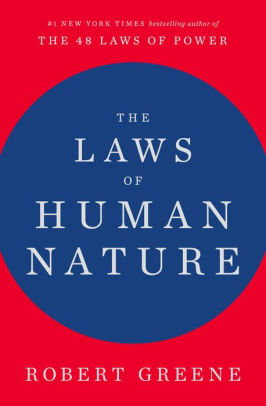The Laws of Human Nature
by Robert Greene (2018)
ISBN: 9780525428145 hardcover
–Review by Douglas Balzer
As an avid student of human beings, the title of this book caught my attention. Then I did my research on the author, Robert Greene, I found a remarkable human being who authored this book after experiencing one of the most frightening health events a human being can face, a stroke. Greene writes, “If you had given me a choice of not writing the book and never having this physical problem, I would have chosen the book.” I am impressed and felt the back story supply a context worth exploring. After reading the book, I can see why it is so important to Greene.
So, who has not asked the question, “Why did they do that?” Human nature is mysterious at best as we look to understand why people do the things they do. It applies to us as well when we examine our activities. Through this book, Greene helps us to understand why people do what they do, as well as how we can use both our psychological flaws and those of others to our advantage in our relationships, at work, and in life.
Drawing from the ideas and examples of various people, Greene teaches us how to deal with our emotions and master self-control, how to develop empathy that leads to insight, how to look behind or beyond people’s masks, and how to resist conformity to develop a unique sense of purpose. Greene offers brilliant tactics for success, self-improvement, and self-defense. Who doesn’t need self-defense techniques in present emotionally driven and identity politics of our culture?
Greene begins with a common lesson we can all relate to –
Self-sabotage is the most common way we ruin our lives. In other words; Master your emotional self. Greene calls this the Law of Irrationality.
We like to believe we are in control of our fate. We can set the course of our lives and successfully navigate it. But the truth is we are mostly unaware of how deeply our emotions dominate us. Whether it is soothing our egos or finding evidence that confirms what we already believe, we see what we want to see (confirmation bias). Depending on our mood, this disconnect from reality is the source of the bad decisions and negative patterns that become the habits of our lives. Greene is a proponent of rationality to help counteract these emotional effects, to take time to think rather than react. Take the time to open our mind to what is happening, as opposed to what we are feeling. It doesn’t come naturally; it is a learned skill we have to practice cultivating, but in praxis, we have the opportunity to realize our highest potential.
Attitude is the key, according to Greene. Having a positive outlook is crucial because it is not usually others who stop us from succeeding, but ourselves so, we must stay positive.
In The Big Leap, Gay Hendricks speaks about self-inflicted upper limits, the ceilings, that prevent us from getting to the next level. The baseline attitude needed for life is a positive attitude, no matter what the circumstances, is the best way to keep yourself from subconsciously setting up a negative attitude as a habit.
Another essential lesson we learn is we are much more complicated than we think. Greene encourages us to transform self-love into empathy. He calls this the Law of Narcissism.
Greene wants us to understand we naturally have the ability for connecting with people and reach social empathy. Now, if we cultivate and effectively use it, we can see into the moods and minds of others, giving us the power to predict people’s actions and gently lower their resistance. This ability, however, is blunted by our habitual self-absorption or narcissism. At many diverse levels, we are all narcissists, some farther out on the spectrum than others. Our mission in life is to come to terms with this self-love and learn how to turn our sensitivity outward, towards others, instead of inward. At the same time, we must recognize the toxic narcissists amongst us before getting entangled in their dreams and infected by their resentment.
These are just two of the laws of human nature Greens shares with us. Other examples include The Law of Role-playing and The Law of Generational Myopia.
Greene delivers a robust, well-seasoned tome for our consideration. The Laws of Human Nature is a long book tightly packed with 18 laws in the form of a compendium that makes it easy to reference. What is great about this book is you don’t have to read in one go, but you can go back to it and easily find your subject or the law you want to explore. Now go forth and study Greene’s The Law of Human Nature there is something special about this book.
Thanks for reading this review. Leave a comment below.

